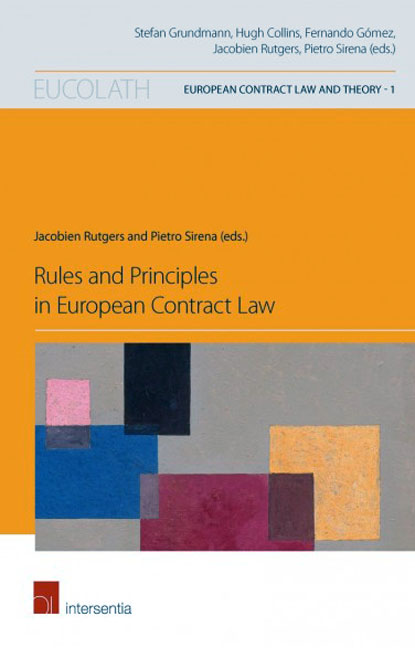Book contents
- Frontmatter
- Contents
- Table of Cases
- List of Authors
- Introduction
- Principles versus Rules in the Emerging European Contract Law
- The ECJ and General Principles Derived from the Acquis Communautaire
- The Principle of Effectiveness and EU Contract Law
- The Principle of Proportionality and European Contract Law
- ‘General Principles’ and ‘Underlying Principles’ in the Proposed Common European Sales Law and their Role in its Interpretation
- Contractual Autonomy and European Private Law
- Good Faith and Reasonableness in European Contract Law
- Benefits to the Defendant as a Measure for Relief: Toward a Specific Rule in European Contract Law?
The Principle of Effectiveness and EU Contract Law
Published online by Cambridge University Press: 28 November 2017
- Frontmatter
- Contents
- Table of Cases
- List of Authors
- Introduction
- Principles versus Rules in the Emerging European Contract Law
- The ECJ and General Principles Derived from the Acquis Communautaire
- The Principle of Effectiveness and EU Contract Law
- The Principle of Proportionality and European Contract Law
- ‘General Principles’ and ‘Underlying Principles’ in the Proposed Common European Sales Law and their Role in its Interpretation
- Contractual Autonomy and European Private Law
- Good Faith and Reasonableness in European Contract Law
- Benefits to the Defendant as a Measure for Relief: Toward a Specific Rule in European Contract Law?
Summary
A CONSTITUTIONAL STARTING POINT: ARTICLE 47 OF THE CHARTER
There has been an intense debate on ‘constitutionalisation of private law’ in general, perhaps less intense with EU private law in particular, and even less with regard to the impact of EU fundamental rights on national contract law. The discussion has mostly been concerned with substantive provisions, e.g. in labour, non-discrimination, services of general economic interest, and consumer law, provided these provisions had a ‘horizontal’ scope of application, that is are applicable between private parties – employer–employee, trader– consumer, provider–client. Indeed, the Charter of Fundamental Rights in the EU contains many gateways in this direction, e.g. Articles 21/23 on non-discrimination, Article 30 on protection against unjustified dismissal, Article 36 on services in the general economic interest, and Article 38 on consumer protection, but their impact on contractual relations is still unclear, particularly if contrasted with the freedom to conduct a business in Article 16 and the right to property in Article 17 Charter. Despite the UK, Polish and Czech opt-outs, I am sure that this debate will continue in the future and will keep the CJEU and national courts as well as legal writing quite busy. In this wonderful new world of constitutionally guaranteed EU rights and freedoms, another provision of the Charter is easily forgotten, namely Article 47(1), which says in plain language:
‘Everyone whose rights and freedoms guaranteed by the law of the Union are violated has the right to an effective remedy before a tribunal in compliance with the conditions laid down in this Article.’
It seems that the importance of this article for private law still remains to be discovered, and of the authors who have referred to it I found only Hans Micklitz's brief remark in the conclusion paper of a EUI conference in 2009 that:
‘Article 47 will have a key role to play. Since 2000 the CJEU has regularly referred to Article 47, oft en in tandem with Articles 6 and 13 (ECHR), but it seems that Alassini was the first occasion where the CJEU was ready to give Article 47 more weight in strengthening the role and function of ADR mechanisms as a means of access to justice.’
- Type
- Chapter
- Information
- Rules and Principles in European Contract Law , pp. 45 - 68Publisher: IntersentiaPrint publication year: 2015



